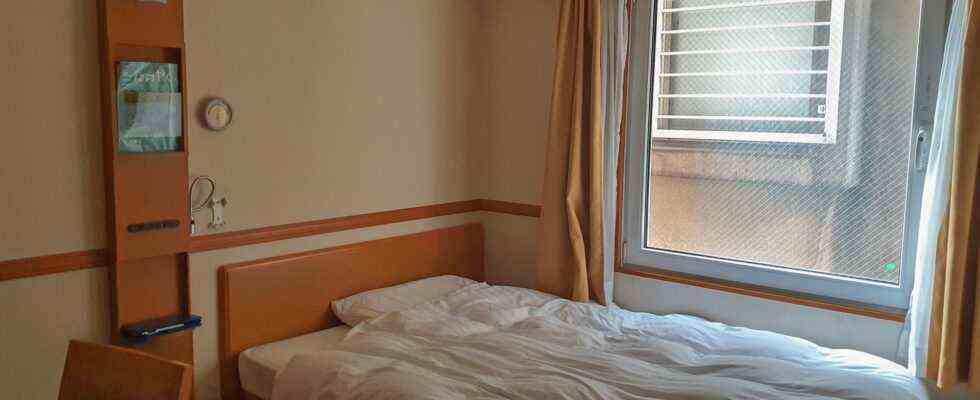Status: 02.07.2021 4:22 a.m.
A fortnight in the room, in self-sufficiency and connected to the outside world via “corridor baskets”: For many reporters who travel to Japan for the Olympic Games, the compulsory quarantine becomes a challenge.
By Julia Linn, ARD-Studio Tokyo,
currently in quarantine
“There is no more water,” says the hotel employee at reception. A message that worries journalists in a quarantine hotel in Tokyo assigned by the Japanese Olympic Committee – after all, they will not be able to buy water bottles themselves until further notice. The supply was too small for the 200 international journalists in the hotel.
The situation when they arrived in Japan had already caused some inconvenience for some: Because the Tokyo-Haneda Airport is currently more reminiscent of a gigantic hospital. Numerous gates have been converted into a corona test station run – “almost like circuit training,” says ARD correspondent Uwe Schwering. Even if the test turns out negative – and even with full vaccination protection – there is no way around the two-week quarantine in order to be able to move freely in Japan.
Initially, however, the range of motion is severely restricted. The rooms in the quarantine hotel are a maximum of ten square meters: a bed, a chair and a desk that barely fits a laptop. The hair dryer hangs directly above the small workplace. “I measured everything when I arrived,” says Belgian image engineer Walter Vanderstukken. “I’m pretty tall, the room feels small. It was difficult at first, but I’m getting used to it.”
The hallway of the quarantine hotel in Tokyo.
Image: Julia Linn / ARD-Studio Tokyo
Waffles for those difficult moments
Patrick Rohr was hit particularly badly for his taste. He is a photojournalist from Switzerland – but his room offers him few motifs, because there is a wall right in front of the window. He has already tried to change rooms three times, he says: “Sumimasen, not possible – excuse me, don’t work, they always say. Nobody has yet been able to explain why not.”
Leaving the quarantine rooms is strictly forbidden. The window can only be tilted a little, the door can only be opened to expose garbage or to empty the “corridor basket” – the only physical connection to the outside world: Hotel employees and so-called liaison officers who control the quarantine deposit in it , PCR tests and daily health forms.
The “corridor basket”: Everything that has to move back and forth between the hotel room and the outside world ends up here.
Image: Julia Linn / ARD-Studio Tokyo
Food that the delivery service leaves at the reception is also placed in the “corridor basket” because the hotel itself does not offer any catering. If you are hungry, you have to order food yourself – but only from 9 a.m. to 9 p.m. and please not too often. “I have something sweet for the difficult moments,” says Vanderstukken. The Belgian had told the flight attendants that he had to be quarantined: “They gave me sweets – stroopwafels and brownies.”
Others have already made provisions at home and brought long-life food with them to Japan. But cutter Tim Woynar already lost some of his provisions at the airport: “My colleague said: ‘Look, the cute little beagle’. As it turned out, it was the sausage dog and I had to give everything. I could of course have known that beforehand . ”
Joint sport via video conference
Quarantine bright spots are rare, but there are, reports reporter Katharina von Tschurtschenthaler: “When there is a knock on the room door and a liaison officer stands there with a flower in hand: ‘I heard you lack nature and fresh air.'” Many Journalists fight the quarantine breakdown with sport – every morning via video conference. “Sweating against madness” is in the subject line.
The journalists are allowed to leave their quarantine two weeks after entering the country. Then there are only a few days left to get an impression of the final preparations for the Olympics and the mood in the country in real life – and to report on them.
Joint sports rounds via video conference help to survive the quarantine period.
Image: Julia Linn / ARD-Studio Tokyo
Because the Japanese government is sticking to the fact that the Olympic Games should start on July 23rd. Even the own population is skeptical: A survey by the Japanese news agency Kyodo News recently showed that 86 percent of people fear a pandemic setback as a result of the major event. 40 percent of those surveyed think that the games should take place without a spectator, almost 31 percent are in favor of canceling it.
So far, Japan, with around 797,000 corona infected people and almost 14,700 deaths, has come through the crisis lightly by international standards. For a few days, however, the country has seen an increase in the number of cases. Researchers from Kyoto and Hokkaido warn: By the time the Olympic Games open, the proportion of the highly contagious Delta variant in new infections could be more than two thirds – and only about one in ten in Japan is still fully vaccinated.

